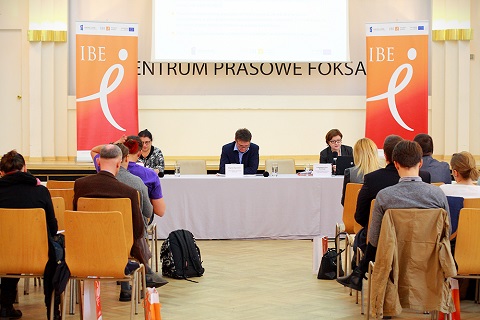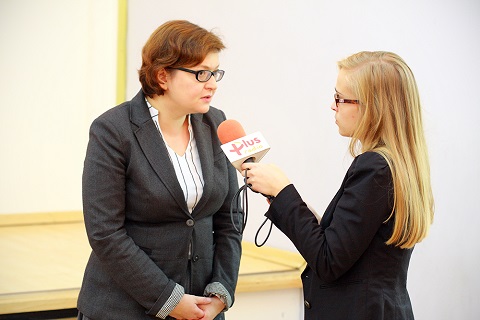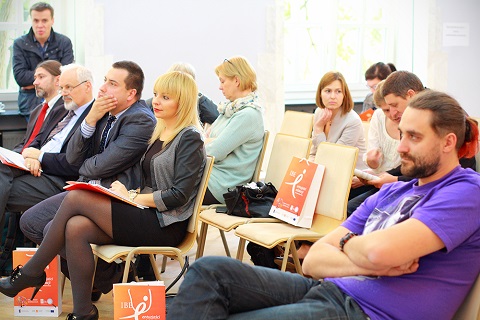Young Poles' skills are the same as their peers' in other OECD countries
- Published on Wednesday, 09 October 2013 21:34
 PIAAC 2013 - IBE experts present the findings of the survey in Warsaw
PIAAC 2013 - IBE experts present the findings of the survey in Warsaw
Young Poles' skills are equal to their peers' in OECD countries. Taking into account the perspective of the last 17 years skill gain in Poland was the largest among the countries surveyed. The PIAAC national report was presented in Warsaw by IBE experts: Agnieszka Chłoń-Domińczak, PhD, and the deputy director of the Institute, Zbigniew Stępniewski.
.The results of the Survey of Adult Skills (PIAAC) were announced in Brussels on 8 October. On the same day, in the 'Press Centre Foksal', IBE experts presented the national report prepared by the team of researchers from the Institute.
Mr Zbigniew Stępniewski, deputy director of IBE, presented the survey to the journalists and guests at the conference. "I believe that the results of the survey should significantly affect the direction in which further discussion on operational programmes , which relate to intervention in the development of human capital, will go," said Mr Stępniewski. He added that the results of the survey should become a part of such documents as the Europe 2020 (developed by the European Commission) and the Human Capital Development Strategy.
Around 166 000 adults aged 16-65 were surveyed in 24 countries from August 2011 to April 2012. In Poland, the sample included nearly 10 000 respondents. The main objective of the project was to measure competence in the areas that are considered essential for the development of the knowledge-based society – literacy, numeracy and problem solving in technology‑rich environments
Young Poles' skills are equal to their peers' in OECD countries
"Competencies measured in PIAAC are necessary for the functioning in the modern world, necessary for the acquisition of knowledge and skills. PIAAC provides information. about the relationship between competencies, education and the labour," said Dr. Agnieszka Chłoń-Domińczak, the leader of the Education and Labour Market Unit at IBE, who presented the findings of the survey. "Data obtained in the survey allow for assessment of the quality of human capital, and on this basis, the assessment of the economic potential, social cohesion and the identification of groups at risk of social exclusion due to a low level of skills," she emphasized.
 Agnieszka Chłoń-Domińczak presented the detailed findings of the survey and answered journalists' questions.
Agnieszka Chłoń-Domińczak presented the detailed findings of the survey and answered journalists' questions.
"The fact that young Poles' skills are equal to their peers' in 22 OECD countries is one of the most important findings of the survey," she said. The results of the PIAAC survey also showed that over the past 17 years the level of skills of the adult Poles has increased. Still, the average results in Poland are slightly below the OECD average. Our position in the ranking is higher owing to the Poles with university degrees, working in the 'knowledge' sectors of the economy and highly skilled office employees.
Polish scores in literacy are only 6 points away from the OECD average (267 Poland - 273 OECD), and 9 points in numeracy (260 Poland - 269 OECD). In literacy Italy and Spain scored lower than Poland. The average numeracy score in Poland is comparable to that of the United Kingdom and is better than the results of the Republic of Ireland, the United States, Italy and Spain.
Parents' education matters
Discussing the methodology, the sample and the scale used in the survey, Ms Chłoń-Domińczak noted that PIAAC covered very diverse population: beginning with people born in 1947, who started their education at the beginning of the 1950s and entering the labour market in the 1960s, ending with people born in 1996, who started their education in the 21st century and - in many cases - haven't yet embarked on their professional careers.
Among the factors affecting the level of skills of the Poles, she mentioned age, sex and place of residence. Young Poles outperform older, women score better in literacy than men, and the results of the inhabitants of large cities are better than those of their rural counterparts.
PIACC confirmed the results of other studies, for example PISA, which showed that the education of parents significantly affects the skills of their children. The scores of the Poles brought up by better educated parents match the average results of similar social groups in the OECD countries. The scores of the Poles with less-educated parents are clearly worse.
The results of the survey confirmed the presence of inequalities in access to higher education - the Poles whose parents have a lower education level are less likely to take up studies, even if they have a high level of competence.
Currently employed do better
Ms Chłoń-Domińczak has pointed out that in all the countries participating in the survey the currently employed respondents show higher literacy and numeracy levels than the unemployed or inactive. The PIAAC results also suggest that the competences of a significant part of the population remain underused. A lot of unemployed people, particularly those out of work for less than two years, demonstrate high level of skills. A longer period of inactivity is associated with a decline in professional competence.
Ms Chłoń-Domińczak also discussed the relationship between sectors of the economy, jobs and Poles' competences. "Having a closer look at the scores of the respondents, based on the type of their employer's business activity, we can see that the highest level of skills is typical of the people whose work is related, among other things, to IT services, finance, insurance, communications, advertising, marketing, real estate, tax consulting and accounting," she said. "This group, referred to collectively as 'modern services', scored on average 299 points in literacy and 295 in numeracy. Both scores are comparable to the average results achieved by those working in similar sectors in the other OECD countries participating in the study.
The survey revealed a clear link between the competence level and earnings. Poland, the Czech Republic, Sweden, Slovakia and Estonia, however, demonstrate a low diversity in income levels associated with skill level.
 The conference was attended by the representatives of governmental institutions, researchers and journalists.
The conference was attended by the representatives of governmental institutions, researchers and journalists.
The 'unmanageable' computer
The last point of the presentation of the results of the survey covered the use of ICT. the ability to use computer, the Internet, for gathering, processing and analysing information, communicating with others and performing practical tasks in the context of private, professional and social lives. The Poles' skills in this area turned out to be the lowest among the countries that have conducted this part of the test. Only 19% of Poles have advanced enough skills to use information and communication technologies compared to 34%, on average, in the OECD countries. Moreover, compared to other countries working Poles less often and less intensively use a computer at work (46% of the Poles never use it compared to 30% in the OECD countries).
Ending the presentation Ms Chłoń-Domińczak said that the results of the PIAAC survey are 'extensive and rich material' that can be used widely in a variety of areas: "Let's treat the survey as a photograph of the point we are currently at and of the areas we need to work on to introduce much needed changes."







